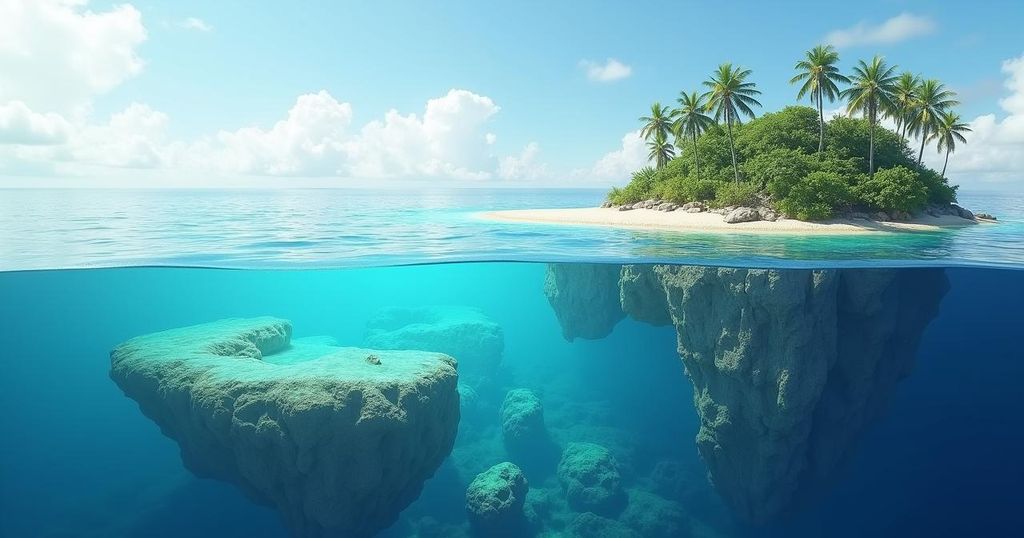U.N. Secretary-General Issues Dire Warning on Rising Sea Levels in the Pacific
U.N. Secretary-General Antonio Guterres has warned of the critical threat posed by rising sea levels to Pacific island nations, citing alarming reports from the UN and WMO. He emphasized that rising seas, fueled by climate change, represent a crisis of human making. The impacts are particularly pronounced in regions like Tonga, where sea levels have risen significantly above the global average, leading to increased flooding and a potential humanitarian crisis. Guterres advocates for urgent action by the global community to mitigate climate impacts and to support vulnerable nations.
U.N. Secretary-General Antonio Guterres recently issued a crucial warning regarding the severe threat posed by rising sea levels, particularly affecting vulnerable Pacific island nations. He emphasized that the escalating crisis, which he termed as a crisis engineered by humanity, requires urgent global attention. Reports released by the United Nations and the World Meteorological Organization (WMO) indicate that sea levels in the Southwestern Pacific are elevating at an alarming rate, exacerbated by the impacts of climate change, such as ocean acidification and marine heat waves. During his visit to Samoa and Tonga, Guterres made a compelling appeal to Pacific Island leaders at a meeting of the Pacific Islands Forum, coinciding with the call for a special session at the United Nations General Assembly next month to further discuss the challenges posed by rising seas. He remarked on the unprecedented scale of the situation, stating, “The ocean is overflowing.” Data reported by Guterres’ office reveals that sea levels in Tonga’s capital, Nuku’alofa, have increased by 21 centimeters (approximately 8.3 inches) from 1990 to 2020, which is double the global average. Similarly alarming is the data from Apia, Samoa, and Suva-B, Fiji, where sea levels have risen by 31 centimeters (1 foot) and 29 centimeters (11.4 inches) respectively. Guterres emphasized that approximately 90% of the population in these Pacific nations lives within a mere 5 kilometers (3 miles) of the coast, putting them at extreme risk. Flooding incidents along coastlines are intensifying, with examples from Guam displaying an increase from twice a year to 22 times a year since 1980. This trend is echoed in several other Pacific territories, indicating a significant alteration in coastal dynamics and the increased threat to local communities. Celeste Saulo, the secretary-general of the WMO, articulated this transformation, stating, “Because of sea level rise, the ocean is transforming from being a lifelong friend into a growing threat.” The reports highlight that the western Pacific region experiences sea level rise at approximately double the global average, primarily due to the effects of melting ice from Western Antarctica and other climatic factors. Guterres, noting the visible changes since his last visit in May 2019, underscored the ongoing shifts in the region’s environment. While community activism remains robust, as exemplified by local high school students advocating for climate justice, the detrimental implications of rising seas particularly affect indigenous populations who may be forced to abandon their ancestral lands. Opinions from experts, such as retired U.S. Geological Survey scientist S. Jeffress Williams, corroborate the dire situation facing low-lying Pacific islands where even modest sea level increases could have catastrophic consequences. Despite their minimal contribution (0.2%) to the global emissions driving climate change, Pacific nations are disproportionately affected by the crisis, with significant upward trends in sea levels attributed primarily to the melting of ice sheets and land glaciers driven by human-induced global warming. The increasing frequency of severe flooding, as documented in the U.N. reports, further illustrates the urgent need for immediate and significant action from wealthier nations to assist vulnerable communities and reduce carbon emissions. Guterres anticipates that Pacific island nations, with their undeniable moral authority, will present their case forcefully at the upcoming General Assembly, advocating for meaningful reductions in emissions by those responsible for escalating sea level rise.
The topic of rising sea levels is of paramount concern within the global discourse on climate change. As global temperatures rise due to greenhouse gas emissions, the resulting melting of polar ice and thermal expansion of seawater contribute to the elevation of sea levels. This phenomenon poses a particular threat to low-lying coastal regions, especially in the Pacific Ocean, where many small island nations are vulnerable to inundation, loss of land, and displacement of communities. The urgent call for climate action has been a recurring theme in international forums, with leaders emphasizing the need for collective responsibility and targeted interventions to mitigate the impacts of climate change.
In summary, the warnings raised by U.N. Secretary-General Antonio Guterres regarding rising sea levels and their unparalleled threat to Pacific island nations signify an urgent call for action. The alarming rise of sea levels, rapid rates of coastal flooding, and disproportionate effects on vulnerable communities underscore the need for immediate global cooperation to address climate change. As wealthier nations contribute significantly to the problem, there is an ethical obligation to implement measures that support affected populations and help reduce greenhouse gas emissions.
Original Source: www.voanews.com




Post Comment